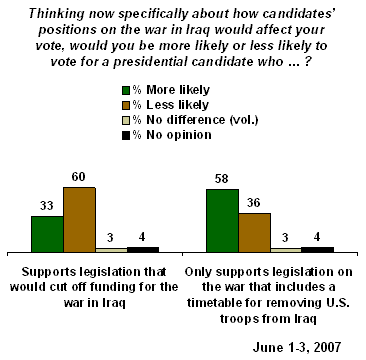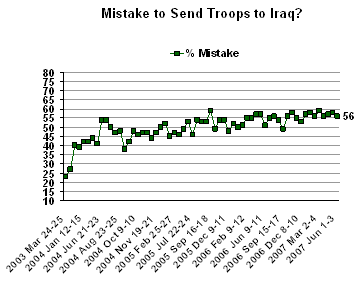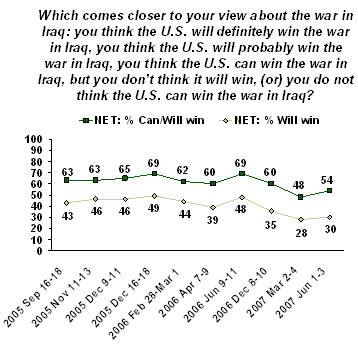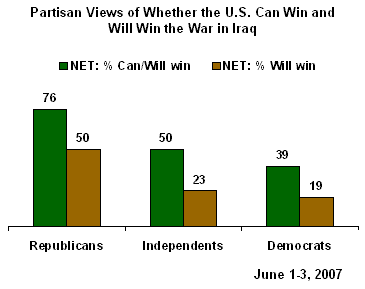Poll: War Support Will Play Major Part in 2008 Election
Gallupby Joseph Carroll
June 8, 2007
PRINCETON, NJ -- The latest USA Today/Gallup poll finds little change in overall support for the war, with more than half of Americans saying it was a mistake to send troops to Iraq. In terms of the 2008 presidential election, Americans say they would be more likely to vote for a presidential candidate who insists on a timetable for removing U.S. troops from Iraq, and less likely to vote for a candidate who wants to cut off funding for the war. More than 7 in 10 Americans say a candidate's position on the Iraq war will be extremely or very important to their vote next year. Even though a majority of Americans say the United States can win the war in Iraq, fewer than one in three predict it actually will win the war. Americans are somewhat more likely than they were in March to say the country can win the war, but many fewer believe this today than in the prior two years.
Iraq and Election 2008
Gallup polling shows that Iraq is clearly the public's No. 1 policy concern, and is likely to play a major role in voting decisions next year. The June 1-3, 2007, poll finds 33% of Americans saying a candidate's past and current positions on Iraq will be extremely important in determining their vote next year, with an additional 41% saying the candidate's positions will be very important. Only about one in four Americans say these will be somewhat important (19%) or not that important (6%).
Delving further into the possible impact of the Iraq issue on the election, the poll asked Americans how two of the more controversial policy proposals on the war would affect their vote. These include a timetable for withdrawing U.S. troops from Iraq and voting to cut off funding for the war, both of which were at the heart of the recent debate on Iraq war funding in Congress.
A majority of Americans, 58%, say they are more likely to vote for a presidential candidate who "only supports legislation on the war that includes a timetable for removing U.S. troops from Iraq." Thirty-six percent say they are less likely to vote for a candidate who insists on such a provision in future Iraq policy.
Only about one in three Americans (33%) say they are more likely to vote for a presidential candidate who "supports legislation that would cut off funding for the war in Iraq," while 60% say they are less likely.

These results fit with previous Gallup polling on Iraq policy, which shows majority support for Congress enacting a troop withdrawal schedule and majority opposition to Congress voting to end its funding of the war.
The recent vote on a war funding bill was a difficult one for some current members of Congress who are running for president -- for Republicans who wanted to avoid the perception that they believe the war should continue its present course indefinitely and for Democrats who wanted to register their opposition to the war and/or try to end it while still showing support for the U.S. military. In the end, the leading Republican presidential hopefuls supported the legislation to continue funding the war while not setting timetables for withdrawal, while most of the Democrats in the Senate who are running for president voted against it. These votes are more or less in line with what the rank-and-file in their respective parties would support.
|
Iraq and Election 2008 June 1-3, 2007 |
|||
|
Republicans |
Independents |
Democrats |
|
|
Likelihood to vote for candidate who supports legislation that would cut off funding for the war in Iraq |
|||
|
More likely |
10% |
36% |
51% |
|
Less likely |
87 |
55 |
39 |
|
Likelihood to vote for candidate who only supports legislation on the war that includes a timetable for removing U.S. troops from Iraq |
|||
|
More likely |
34% |
61% |
78% |
|
Less likely |
58 |
33 |
16 |
A slim majority of Democrats, 51%, say they are more likely to vote for a presidential candidate who supports cutting off funding for the Iraq war, while 39% say they are less likely. The vast majority of Democrats, 78%, say they are more likely to vote for a candidate who insists on a timetable for troop withdrawal.
Republicans are disinclined to vote for a candidate who takes either position -- 87% say they are less likely to vote for a candidate who would cease funding for the war, and 58% are less likely to support a candidate who would insist on a withdrawal timetable.
Independents tend to side with the Democrats on a timetable for troop withdrawal and the Republicans on cutting funding to the war. Sixty-one percent of independents say they are more likely to vote for a candidate who insists on a timetable for removing U.S. troops, and 55% say they are less likely to vote for a candidate who supports legislation to cut war funding.
The candidates' votes on this most recent funding bill, as well as their prior positions on the Iraq war, have been a major part of the campaign thus far, and will continue to be in the future. At this point, it appears the Iraq war issue has vulnerabilities for candidates of both parties -- in the general election phase if not in the primary phase -- with Republican candidates generally rejecting a timetable for withdrawal that most Americans support, and Democrats voting against the funding for the war that most Americans want to continue.
In the latest poll, 56% of Americans say the United States made a mistake in sending troops to Iraq, while 40% say it was not a mistake. Public opinion on this question has been stable for quite some time, averaging 57% since January. A majority of Americans have opposed the war since the late summer of 2005 (with the exception of two polls in which Americans were more evenly divided in their views of the war).

Winning the War
The poll updated a trend that asks Americans about the chances of the United States winning the war in Iraq. The results show that 10% of Americans say the country will "definitely win" the war in Iraq, while another 20% say it will "probably win." Twenty-four percent believe the United States can win the war but will not, and the largest percentage, 41%, believe the United States cannot win the war.
The 54% of Americans who feel the country can win the war in Iraq is up slightly from 48% in March, but is lower than any other time Gallup asked this question. During 2005 and 2006, at least 6 in 10 Americans said the country could win the war in Iraq.
The 30% of Americans who say the country will win the war is similar to the 28% measured in March, which was the lowest recorded to date. Prior to this year, between 35% and 49% of Americans believed the United States would prevail in Iraq.

Republicans are much more positive than independents or Democrats about the country's chances of winning the war in Iraq. Seventy-six percent of Republicans say the United States can win the war in Iraq, while 50% believe it will do so. This compares with 39% of Democrats who say the country can win, and only 19% who say it will. Half of independents believe the country can win the war, but just 23% say it will.

Survey Methods
Results are based on telephone interviews with 1,007 national adults, aged 18 and older, conducted June 1-3, 2007. For results based on the total sample of national adults, one can say with 95% confidence that the maximum margin of sampling error is ±3 percentage points. In addition to sampling error, question wording and practical difficulties in conducting surveys can introduce error or bias into the findings of public opinion polls.
